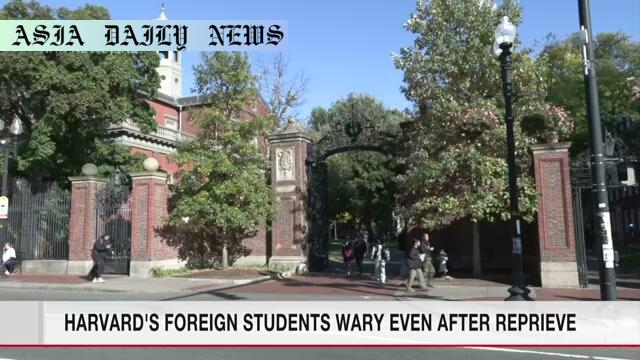Harvard court blocks Trump’s ban affecting international students, preventing immediate impact on foreign attendees.
- The US court temporarily halted Trump’s ban affecting Harvard’s international students.
- The ruling protects 6,800 students, including royalty, from displacement.
- The administration criticized the decision for impeding justice.
- Foreign students still face uncertainty despite the temporary reprieve.

Introduction to the Issue
The tension between higher education and governmental policies heightened as a US court temporarily halted a controversial decision by the Trump administration targeting international students at Harvard University. This decision came as a response to a major legal challenge filed by the university itself and has, for now, provided relief to approximately 6,800 students enrolled in the institution. These students, many sourced from diverse global backgrounds, had faced the looming threat of losing legal status or being forced to transfer due to accusations directed at Harvard by the administration.
Why the Ban Was Proposed
The Trump administration’s controversial policy was rooted in allegations that Harvard fostered an environment that promoted violence and antisemitism on its campus. Acting under this premise, the government declared that international students could be required to either transfer to other institutions or exit the country entirely if the situation was not addressed. Such a move posed not only logistical headaches for the students but also a blow to Harvard’s global educational reputation.
The Immediate Court Ruling
The court ruling in favor of Harvard was a significant turning point, instantly blocking the administration’s plan from taking effect. While the decision is undoubtedly celebrated among students and university officials, it remains temporary. The Department of Homeland Security voiced strong objections to the court’s ruling, asserting that it delays justice and undermines presidential authority. Nevertheless, this immediate block has prevented the policy from causing abrupt disruptions in students’ academic lives.
The Global Impact: Royals and Prominent Families
This ruling is of high significance, particularly for prominent foreign figures enrolled at Harvard. Among the student body are Belgian heir Princess Elisabeth and the daughter of Canadian Prime Minister Mark Carney. Princess Elisabeth, for instance, has been pursuing a master’s degree in public policy and has already completed her first year, making the ban particularly devastating for her future academic plans. Statements from the Belgian royal palace indicated ongoing investigations into how this decision could directly impact her education.
Foreign Students’ Challenges
Despite this court victory, uncertainty prevails for many international students. For those thousands who rely on stability in US immigration policies to plan educational and career objectives, such rulings create a precarious atmosphere. The possibility of a reversal of the ruling or further administrative measures casts shadows over what should ideally remain an unwavering promise of education and broad-minded global exposure.
Policy Implications
This policy and its subsequent court ruling represent more than just a skirmish between an administration and an institution. It raises the broader question of how governmental immigration strategies affect educational systems. Harvard, serving not just as a university but as an academic beacon, attracts scholars from across the globe. Targeting such institutions with restrictive policies feels not only anti-educational but also counterproductive to diversification goals essential in academia.
Conclusion and Hope for Stability
While the court’s halt has provided temporary relief, this scenario underscores the intricate connections between education, politics, and global collaboration. Institutions like Harvard thrive on their capacity to embrace talented individuals from various parts of the world. Policies scrutinizing these very principles risk not only educational interruption but also long-term damage to the country’s reputation in fostering intellectual diversity. The hope remains that forward-thinking policy deliberations will ensure stability and protection for students globally.



Commentary
The Complexity of Balancing Immigration and Education
The recent policy targeting international students at Harvard University highlights a complex intersection of education and immigration policies in the United States. Academic institutions serve as cultural and intellectual crossroads, with diverse student bodies enriching the learning experience for all. It is concerning when political motives jeopardize this delicate ecosystem, creating fear and uncertainty, particularly among students who have left their homes in pursuit of academic and career growth.
Lessons for Global Educational Diplomacy
What can we learn from this? The situation sheds light on how interconnected our world has become. Higher education institutions have always been melting pots of innovation and collaboration, and restrictive policies undermine their ability to maintain these critical roles. Harvard’s strength lies in its diversity, not just within its student demographic but also in the ideas and solutions stemming from its global community. It’s unsettling to witness policies that interrupt this dynamic.
Hope for Policy Reforms
Thankfully, the court’s intervention has provided temporary respite. Yet, we must ask what steps are necessary to prevent similar conflicts in the future. Governments and educational institutions need open dialogue to address security, societal concerns, and academic freedom. Policies that pit these elements against one another ultimately hurt not just the individuals directly affected but society at large. Education should be a bridge, not a battleground.
The Larger Question
Lastly, we need to consider the long-term ramifications of decisions like these. How does creating an unpredictable landscape for international students impact the United States’ position as a leader in global education? Actions speak louder than words, and fostering trust and inclusivity in policies will do far more for national interests than protectionist measures. As the world closely watches this case, policymakers have an opportunity to set a precedent of cooperation over division.